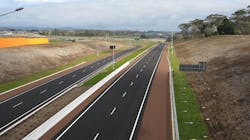Three ways COVID-19 has changed road usage and how the public travels
During the global COVID-19 pandemic, the way in which we use the roads and travel has changed, which means the way that everyone lives across the globe has changed too. Here is how the restrictions on non-essential movement have impacted road usage and what permanent changes could happen as a result for road users.
Environmental impact
Since lockdowns due to COVID-19 meant a decrease in demand for products and materials, it also meant that large scale transportation decreased. From machinery movers or delivery drivers, there were simply fewer people on the roads. However, the reduction in road usage has resulted a sharp decline in carbon emissions. An international study found that daily emissions have declined 17 percent between January and early April, compared to average levels in 2019, making it the largest annual decrease in carbon emissions since World War II, researchers said.
By the end of April, carbon emissions declined by 1,048 metric tons of CO2. China and the U.S. are the two largest carbon emitters globally, and this is reflected in the decline. In China, emissions dropped 533,500-plus pounds and by 456,350-plus pounds for the U.S.
In various countries, congestion has changed dramatically during lockdown. In Wuhan, China, where the virus had its first outbreak, it shows that the congestion levels were less than half of the same point last year and that after 10 weeks in lockdown it is only slowly emerging from this pattern. This pattern was repeated in most major cities across the globe that chose to go into strict lockdown, and the cities that didn’t similarly saw only very limited reductions in congestion. Shanghai had a strict lockdown, but it is interesting to see how quickly a city of 23 million people returned to normal levels of circulation.
Whilst the reduction in travel has benefited the environment, carbon emissions will eventually increase as lockdown restrictions and travel bans are lifted and the public can travel more freely. What remains to be seen is if the governing bodies of these countries or cities will enact new measures to try to keep carbon emissions lower in city centers. Paris, Athens and Berlin have all spoken of liberating their city spaces from the use of cars and turning the areas over to cycle paths and public transportation.
Public transport
Due to travel restrictions, the use of buses, taxis and other forms of transport have declined. As the UK and rest of the world are starting a phased return to normality, public transport usage will eventually see a resurgence. Cities like Milan are putting measures in place for the expansion of spaces on their current streets to allow for wider walking and cycling paths. To do this, they will reduce the space allocated as road usage. As previously mentioned, similar schemes or suggestions have been made in Berlin, Athens, Paris, Dublin and Budapest, with some of these cities placing temporary cycles lanes in to help alleviate the lockdown transportation issues; but many hope that they will become permanent features.
Proposed changes to public transport in the UK are heavily geared towards a carbon-reduced transport future. A document published in March by the UK Government recognized that the use of cars needs to be reduced and instead use trains, buses and walking routes as a first choice once the pandemic has diminished and normal life has returned. The United Nations Climate Change Conference talks that the UK will be hosting next year will focus mainly on transportation emissions and ways that this can be maintained at a level that is beneficial to the environment.
New technology
Technology is and will continue to progress in all areas of life, and the road networks and traffic systems are no exception with traffic monitoring tech already in place across UK roadways. This gives the UK the ability to control the flow of traffic and preempt issues with accidents at rush hour. To assess the impact of COVID-19, there has been an increased focus in developing technological solutions for monitoring transport. Vivacity Labs has worked on AI-based video road sensors to assess the impact of the Coronavirus on daily travels on highway networks.
The research had found that by March 25, 2020, there had been a 60-percent decrease in traffic across the UK. Buses have seen a 40-percent drop since the lockdown, and motorbikes dropped by 65 percent and HGV volumes by 40 percent, although initially the drop was very slow. The largest drop off was in pedestrians at 80 percent and cyclists dropped by 75 percent since April 6. Overall, there is a consistent drop in all traffic, but also a marked increase in home deliveries.
With emphasis on post COVID-19 and post lockdown seeming to be leaning towards more pedestrianized city centers, there's also a greater emphasis on public transport and green alternatives to keep the CO2 emissions lower. There are research and development companies across the world working on solar panel roads, kinetic electrical charging roads, road police drones, self-healing concrete to repair surfaces and smaller changes like changing the color of the roads themselves. The switch between dark and light road surfaces can reduce the surface temperatures by 10 to 25 degrees.
----------

Mark Marshall | Sales Director, Flegg Projects
Mark Marshall's entire working life has involved moving high-value, hazardous freight or machinery. He has worked in project management, operations, finance, sales, account management, commercial and marketing roles. Marshall's career began when he left school at 16 and joined a local family run transport company in High Wycombe, a town about 35 miles west of London, UK. Initially learning what was involved to keep a large fleet of vehicles safely and legally on the road.
After a few years in, Marshall was moved into the department that was responsible for moving machinery from various European locations into the UK/Ireland. This part of the business also arranged the offloading and installation of the machines at destinations. Eventually, this division was sold to a local firm called Flegg Transport and Marshall was transferred a different part of the business.
Marshall's new role involved the organization of transport of high value goods and radioactive materials across Europe. After a few years in this role, the company was taken over by a large French company and things changed. At this point, Marshall wanted to move onto a different challenge and a job became available at Flegg Transport – working with a previous boss.
Marshall has been with Flegg’s since 2001 and has fulfilled several roles including joining the board of directors in 2007. During this time, the business has grown in terms of turnover, fleet size and number of employees. Today, the business (known as Flegg Projects) has become one of the leading contractors in the UK. Offering a range of services to companies looking to install, re-locate or remove capital equipment.



